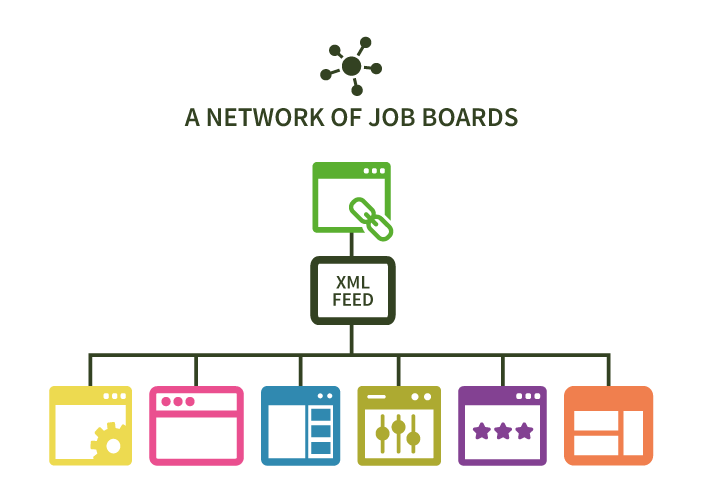Picking up from where we left off last week with Part 1 of 2, we’re delving into a couple of scenarios/arrangements where your business might involve multiple job boards, and today we’re covering…
SCENARIO 2: ONE BOARD TO RULE THEM ALL
You have big ideas. A vision! You know there are a lot of job boards out there who could be more successful, and make their customers more successful, with increased traffic. And you’ve got a plan to make that happen.
WHAT’S MY BUSINESS MODEL?
You’ve identified your job board partners, each of which is independently owned. Either you’ve arranged to work together with several of them to get started, or you’re ready to pitch your plan is to create one job board site that will take in all the jobs from your partners’ boards, and list them on your site.
You’ve got a plan to promote and market your board, which will then send job seekers to your partner job boards through the jobs you list. Your differentiator is that you list all the jobs from all your network partners, making your job board a one stop shop. Your strategy and positioning is very important, here.
If you plan to focus your job board network on the retail sector, your partner sites could specialize in different areas within that industry, such as merchandising jobs, point of sale jobs, management, customer service, or different regions. You could then position your job board network as the go-to source for retail jobs everywhere, and your job board partners would benefit from the increased exposure you deliver to their jobs.

HOW DOES THAT EVEN WORK?
It’s actually not that complicated, if you’ve got the right technology. You want to work with a series of independently owned job boards, by taking in their job content and posting it on your own site. This can be accomplished with XML feeds that export jobs posted to your partner sites, and then import that content to publish it on your network site.
The difference here is that while the boards’ job content is fed into your database, their customer and candidate data remains separated. Each job board partner maintains its own database separately, and they do not risk their customers being poached by you or the other network members because of data leaks from a shared or partitioned database.
WHAT’S THE USER EXPERIENCE?
Users who arrive at your site can search for all the jobs within your network. But unlike in Scenario 1, a job seeker or employer who is registered on one partner site will have to create a new account on any other site within the network.
So there you have it: two possible scenarios in which multiple job boards can work for your business. There are certainly more scenarios and more business and technical models that could work, but there are several important factors to consider and plan for when your business involves multiple job boards:
- Business Partnerships: If you’re teaming up with one or multiple other parties, be clear on where the boundaries lie between your business and theirs and what obligations or services are supposed to be met or provided.
- Data Ownership: If you are working with other businesses, spell out exactly where each job board website’s data lives, whether it is shared or completely separate, and who owns what.
- Technical Connections: How will it work? Make sure you understand what connections are being made between each site, as well as how.
- User Experience: Never forget about the user. Where and how do they sign up? Log in? Does their data get shared or moved around? Where do candidates apply for positions? Where to recruiters post jobs?
Make sure you have a good grasp on all these factors, so that if you know what you’re looking to achieve for your business and your users, you can find the technology and data set-up that work for you.

